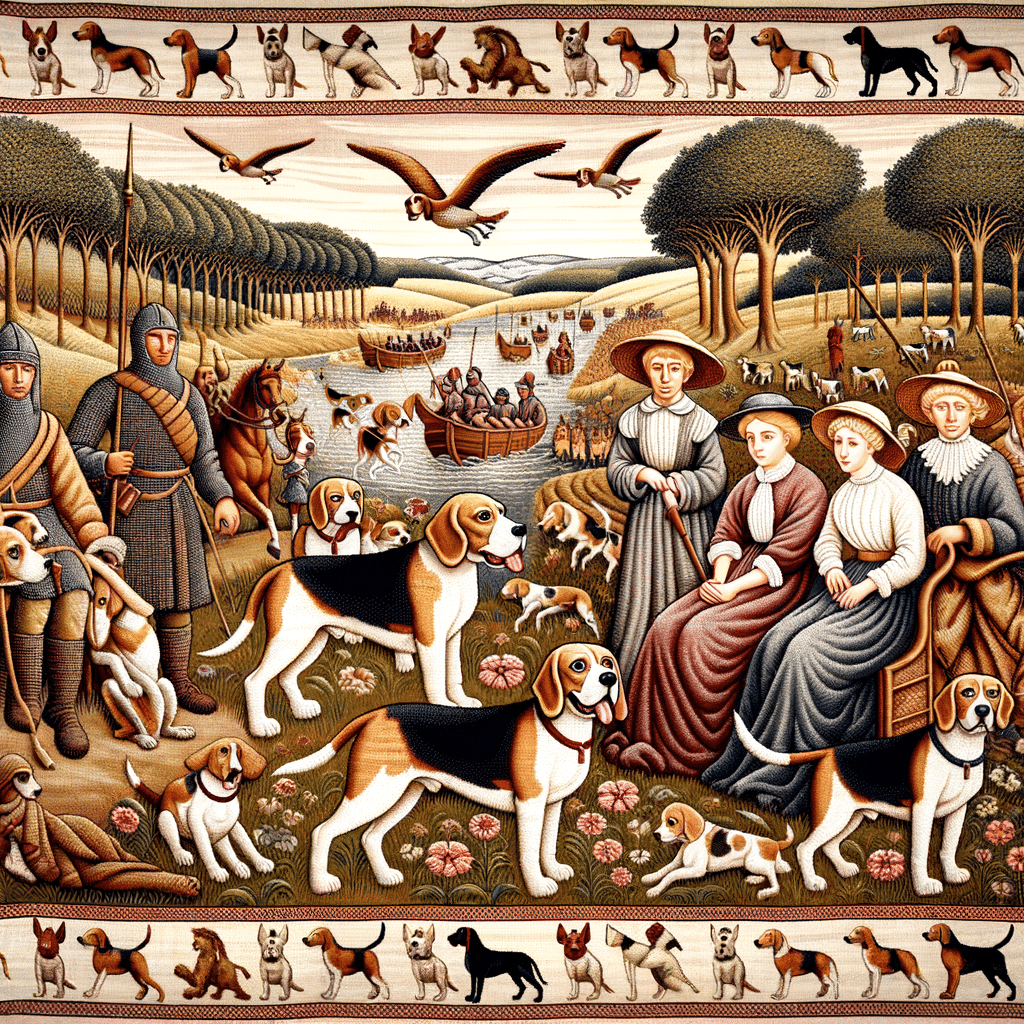Beagles are a dog breed with a distinctive vocalization in the form of a howl, a trait that has been both a preferred utility and a quirk for their owners over the years. The howl, deeply ingrained in the beagle’s ancestry, was historically vital for hunters to locate their dogs after locating their prey’s scent. Today, while the necessity for hunting companionship has diminished, howling remains a core part of beagle communication.
In This Article
Understanding the various reasons why beagles howl is essential for owners to respond to and manage this behavior appropriately. Howling can signify anything from the discovery of prey to a method of attention-seeking or even a response to boredom or anxiety.
This vocal expression can also be linked to their pack mentality, tracing back to their wolf ancestors who used howling to regroup with members after a hunt. Recognizing these factors can assist owners in addressing unwanted howling in a domestic setting, which will maintain harmony in the home and neighborhood.
Highlights
- Beagle howling is a natural behavior that has historical significance for hunting.
- It can indicate a beagle’s need for attention, their success in tracking, or their response to solitude.
- Understanding and managing howling behavior is crucial for a harmonious relationship with a beagle.
Understanding Beagle Behavior
Beagles exhibit distinct vocal behaviors, like howling, that are deeply rooted in their genetics and history as pack animals and scent hounds. The following subsections delve into the reasons behind their specific vocalizations.
The Beagle’s Pack Mentality
Beagles are naturally pack animals, meaning they have a strong pack mentality. This instinct drives them to seek connection and communication with their pack, which in domestic settings includes their human family members and other pets. When a beagle howls, it can be a sign of trying to establish its place in the social hierarchy or to reunite with its pack.
The Influence of Hunting Instincts
Breeders historically developed beagles as hunting dogs, and their behavior is heavily influenced by hunting instincts. Scent hounds were bred to track and hunt prey for their human masters, and they were trained to howl to alert their human companions of a find. Even in a non-hunting context, beagles might use howling to respond to things that trigger their internal drive to hunt.
Communication Through Howling
Howling serves as a powerful method of communication among beagles. It’s a vocal expression that can convey various messages‚ from a demonstration of their discovery during a hunt to attention-seeking behavior when they feel alone or bored. Beagles may also bark and howl to signal their presence to other dogs or to communicate with their human owners.
Factors Contributing to Howling
Beagles howl for various reasons, from communication to indicating distress or response to environmental changes. Howling in beagles can be a nuanced behavior influenced by their genetics and current environment.
Separation Anxiety in Beagles
Separation anxiety is a common trigger for howling in beagles. When left alone, these dogs may feel lonely and anxious, leading them to howl to get attention from their owners or to express their discomfort. Howling serves as a vocal signal they use to attempt to reconnect with their absent human companions.
Response to Environmental Stimuli
Beagles have a highly developed nose, making them sensitive to their environment’s scent triggers. This powerful sense of smell can lead them to howl in excitement or when they have located a potential prey. Environmental stimuli like sirens, loud noises, or boredom can also prompt a beagle to howl. Howling is a form of communication, reacting to both the excitement of the discovery and as a notification to their owners or fellow pack members.
Signs of Pain or Discomfort
Howling might indicate pain or discomfort in beagles. If this behavior occurs with other signs of distress, it could be a plea for help. Owners need to recognize this type of howling and distinguish it from other causes. A sudden onset of excessive howling demands a thorough check to rule out any health issues.
Preventing and Managing Howling
To effectively prevent and manage howling in beagles, it’s important to focus on consistent training, providing adequate mental and physical engagement, and creating a nurturing environment.
Effective Training Strategies
Training is a key aspect of managing howling behaviors. Consistent obedience training can help address attention-seeking howls. Implementing positive reinforcement techniques responsibly rewards the beagle when it remains quiet. Begin by teaching simple commands like “quiet” and provide a treat when the command is obeyed. If a beagle howls, owners should avoid giving them attention immediately, as this can reinforce the howling behavior.
Providing Mental and Physical Stimulation
A bored beagle can often resort to excessive howling. To prevent this, owners should ensure their beagle has plenty of toys and games for mental stimulation. Interactive toys that challenge them can help distract them from separation anxiety. Physical exercise is equally important. Daily walks, runs, or a game of fetch can provide the needed exercise to alleviate boredom and suppress the need to howl.
Creating a Supportive Environment
Creating a supportive environment means addressing the emotional needs of a beagle. Dogs that howl out of separation anxiety or because they seek attention require a safe space where they feel secure. Family members should establish a routine that the dog can rely on, reducing stress and uncertainty. If a beagle howls due to a lack of comfort, adjusting the environmental factors like temperature and bedding can help create a more comfortable living space.
Frequently Asked Questions
Beagle howling is influenced by their strong hunting instincts and communicative nature. Understanding the triggers and context of their vocalizations can guide owners in managing this behavior.
What causes beagles to howl, especially during nighttime?
Beagles howling at night is often due to their acute sense of hearing picking up distant sounds or as a response to loneliness. It is a way for them to express alertness or signal the presence of something unusual in their environment.
Are there effective methods to prevent a beagle from howling when left alone?
Preventing a beagle from howling when left alone can be achieved by providing adequate physical and mental stimulation, establishing a comfortable environment, and using positive reinforcement to encourage quiet behavior.
What are the different vocalizations a beagle might exhibit?
Beagles might exhibit a variety of vocalizations, including howling, barking, and baying. Howling communicates over long distances while barking could indicate alertness or protection. Baying is often related to hunting.
How can you discourage a beagle from barking at unfamiliar people?
Discouraging a beagle from barking at unfamiliar people involves socialization training to reduce fear and anxiety and teaching commands such as “quiet” to control vocal outbursts.
Is it possible to train beagles to be quiet during the night?
Training beagles to be quiet during the night entails setting a consistent routine, providing adequate exercise before bedtime, and using nighttime crates or designated sleeping areas to promote calm behavior.
What does it signify if a beagle howls directly at someone?
If a beagle howls directly at a person, it could signify a form of communication, an attempt to gain attention, or a reaction to a person’s body language or emotions. It might also be a sign of recognition if the individual is familiar.






